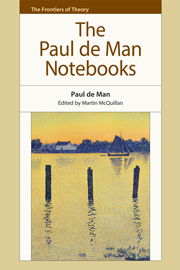Book contents
- Frontmatter
- Contents
- Series Editor's Preface
- Acknowledgements
- Dedication
- Introduction: ‘The Unimaginable Touch of Time’: The Public and Private in the Notebooks of Paul de Man
- PART I Texts
- 1 The Drawings of Paul Valéry (1948)
- 2 Jacques Villon (1952)
- 3 Graduate Essay on Keats (1954)
- 4 Postdoctoral Essay on Symbolism (c. 1960)
- 5 Introduction to Madame Bovary (1965)
- 6 Introduction to The Portable Rousseau (1973)
- 7 On Reading Rousseau (1977)
- 8 Translator's Introduction to “Rousseau and English Romanticism” (1978)
- 9 Rousseau and English Romanticism (1978)
- 10 Introduction to Studies in Romanticism (1979)
- 11 Hommage à Georges Poulet (1982)
- 12 A Letter from Paul de Man (1982)
- 13 Reply to Raymond Geuss (1983)
- 14 Interview with Robert Moynihan (1984)
- PART II Translations
- PART III Teaching
- PART IV Research
- Appendix. The Notebooks of Paul de Man 1963–83
- Bibliography
- Index of Names
6 - Introduction to The Portable Rousseau (1973)
from PART I - Texts
Published online by Cambridge University Press: 05 December 2014
- Frontmatter
- Contents
- Series Editor's Preface
- Acknowledgements
- Dedication
- Introduction: ‘The Unimaginable Touch of Time’: The Public and Private in the Notebooks of Paul de Man
- PART I Texts
- 1 The Drawings of Paul Valéry (1948)
- 2 Jacques Villon (1952)
- 3 Graduate Essay on Keats (1954)
- 4 Postdoctoral Essay on Symbolism (c. 1960)
- 5 Introduction to Madame Bovary (1965)
- 6 Introduction to The Portable Rousseau (1973)
- 7 On Reading Rousseau (1977)
- 8 Translator's Introduction to “Rousseau and English Romanticism” (1978)
- 9 Rousseau and English Romanticism (1978)
- 10 Introduction to Studies in Romanticism (1979)
- 11 Hommage à Georges Poulet (1982)
- 12 A Letter from Paul de Man (1982)
- 13 Reply to Raymond Geuss (1983)
- 14 Interview with Robert Moynihan (1984)
- PART II Translations
- PART III Teaching
- PART IV Research
- Appendix. The Notebooks of Paul de Man 1963–83
- Bibliography
- Index of Names
Summary
The notion of textual allegory, as it derives from the Social Contract, provides the generalizing principle which makes it possible to consider theotropical or ethical allegories as particularized versions of this generative model and thus to break down the significance of such thematic distinctions. It also implies that the terminology of generality, particularity, and generative power has a degree of referential undecidability which should exclude any simplified metaphorical use of these terms, while anticipating the failure to achieve such vigilance, or such immunity to rhetorical seduction. If, for example, we consider the introduction of a theological dimension into the political context of the Social Contract as the thematization of a structure that cannot be separated from the textuality of any text (the inherent necessity, for any operative language, to postulate transcendental signification), then the “inclusion” of a deconstructed version of the Profession de foi within the context of the Social Contract is predictable, since both works can be considered as the same political allegory, the first on a figural, the second on a textual level. The Profession de foi is the text whose texuality the Social Contract deconstructs. This insertion of the Profession into the Contract becomes manifest in the chapter “De la Religion Civil,” which was presumably composed as an extension of the earlier chapter on the Legislator, and reads like a translation of the Profession de foi into the language of Nietzsche's Antichrist.
- Type
- Chapter
- Information
- The Paul de Man Notebooks , pp. 69 - 76Publisher: Edinburgh University PressPrint publication year: 2014



